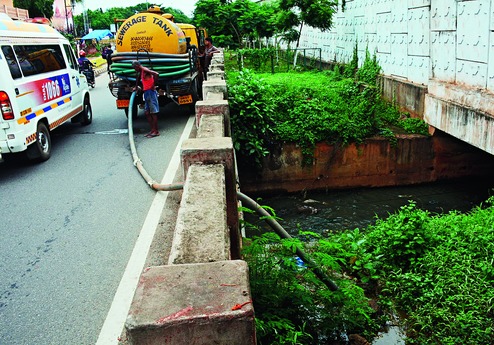
Bhubaneswar, July 25: The municipal corporation here has turned a blind eye to proper implementation of the septage management rules in various parts of the city.
The state government has come up with the Odisha Urban Sanitation Strategy with Focus on Faecal Sludge and Septage Management Guidelines, 2016, to check faecal contamination of drinking water to avoid diseases such as jaundice.
However, the cesspool emptier vehicles are often found releasing wastewater in open drains mainly in the areas such as Acharya Vihar and Jayadev Vihar. One of the important components of the new guidelines is to ensure safe disposal of sludge or even have a separate facility to treat the dirty water in a proper manner, so that it would not pollute the nearby areas or drains.
"Several cesspool emptier vehicles come here on a regular basis and release wastewater into the drainage channels. The wastewater gets mixed with other drains and finally the riverbed. This creates unhygienic condition in the area," said Acharya Vihar resident Bhawani Shankar Panigrahy.
The housing and urban development department framed the new guidelines mainly after faecal contamination of drinking water had become the reason of jaundice in several parts of the state in the past. The disease has affected more than 50 persons in the city last year.
"The administration is not bothered about citizens' safety. Promises are tall, but implementation is zero. Such sludge disposal is not only affecting the water, but also prevailing a smelly environment around the area," said Jayadev Vihar resident Dibyansh Hota.
The new guidelines mandate every residence to have septic tanks of its own and ensure safe discharge of the waste into the municipal drains. The civic body officials have been asked to visit residences to check whether the citizens have septic tanks and are disposing of waste safely.
It was also decided to operationalise a special septage management cell in the civic body's headquarters to ensure smooth implementation of the guidelines. "We have already operationalised the septage management cell, which is looking after implementation of the guidelines. We will look into the matter if there is any violation," said an official of the civic body.
He said there were plans to conduct regular inspection of septic tanks and monitoring of the cesspool emptier vehicles. "Anyone found to have not ensuring proper management of the septic tanks will be fined up to Rs 1,000," said the official, adding that if the violation continued, Rs 500 will be charged per day from the next violation.
Mayor Ananta Narayan Jena said they had absolute zero tolerance for such violation. "I will personally look into the matter and ensure implementation of the new guidelines in spirit," he said.











